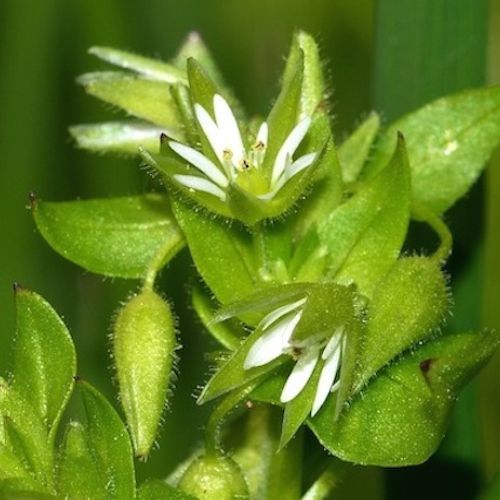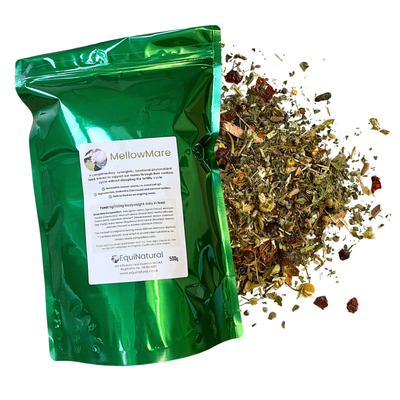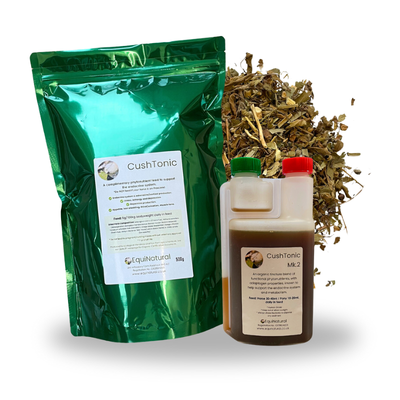ESTABLISHED 2006
Over 50,000 Orders Shipped
NEXT DAY UK DELIVERY
Worldwide Shipping 3-5 Days
SUBSCRIPTIONS
Subscribe & Save!
RATED ★ ★ ★ ★ ★
1100+ 5* Reviews
CHICKWEED (Stellaria media)
Available either as a dried herb or herbal tincture.
Please note this is a nutritional, functional horse food supplement and not veterinary medicine. See Dr Kellon's Horse Sense - 'Nutrition is not 'Alternative' Therapy.
Tincture
Our human-grade, certified organic tinctures give you a ready-to-absorb potent source of phytonutrients at the highest-strength available, for immediate absorption straight into the bloodstream and to the body’s cells.
100% certified organic pure tincture: Stellaria media (Chickweed )Herb, Infused 1:3 35%, Organically Cultivated
~ Feed Guide
- 6ml/100kg bodyweight, daily in feed.
- Always shake the bottle to disperse any sediment.
- 3-year shelf-life.
Dried Herb
Certified organic dried herb:
Stellaria media (Chickweed )Herb, Wild Harvested, Origin Bulgaria
~ Feed Guide
- 5g/100kg bodyweight per day, thus for an average 500kg horse add 25g daily to feed.
- 1-year shelf-life.
Functional Nutritional Value
Constituents: Triterpenoid saponins, phytosterols, coumarins, mucilage, vitamins (A, C, E, and B complex), minerals (calcium, copper, iron, magnesium, manganese, phosphorus, potassium, silicon, sodium, and zinc), rutin, gamma-linolenic acid, and bioflavonoids.
NB. Our range of botanicals are all grown, harvested and dried without the use of agri-chemicals, non-irradiated and GMO free - see our Quality page for Quality Management & Certification Documents. Laboratory tested for identification and compliance to the British and European Pharmacopoeia standards, and are human grade.
Please be aware that if you're purchasing our dried botanicals for human use, our dried range is cut to appropriate sizes for feeding to horses.
More ...
Chickweed is without doubt the poster plant for how nutrient-rich herbs can give such a dramatically positive health outcome with relatively little effort. This wild, weedy green is best when eaten, tinctured, or otherwise prepared fresh, making it a wonderful tonic for the body to regain vitality after the deficiencies of winter.
Many chronic conditions are positively affected by nourishing the body with nutritive and tonifying herbs, and chickweed as a food is no exception - for us humans it's as easy as it is yummy to add in salads, soups, stews, or as a cooked green. Herbal vinegars? No problem - it's a great way to extract the nutritive qualities of chickweed to be useful at any time year-round.
Chickweed is one of the first to appear each year, ready to help us revitalise for the hard work to come in summer. It recedes during the summer heat and reappears vigorously once autumn cools everything down again.
A kidney supporter, chickweed is used to balance water throughout the body, clearing lymphatic congestion and clearing water through the kidneys. To quote herbalist Matthew Wood, “There is no area in the alterative category (liver, lymphatics, endocrine, kidneys, skin, intestines, lungs) it does not touch.” Chickweed supports movement and elimination of toxins and substances through these organs and systems.
It's also thought to help remove congestion and infection from the body, said to break down “inferior proteins in the body such as tumours,” (quoted from herbalist Katrina Blair in 2014). She continues to say that the saponins found in chickweed help dissolve excesses in the body such as mucus, bacteria, undigested proteins, and fat cells, and help with assimilation and elimination of cysts and lumps . And Matthew Wood agrees, saying that chickweed is considered particularly helpful for dispersing lipomas (fatty tumours). Hence why historically it was a common folk herb for weight loss.
It's said that chickweed has a central theme to its herbal properties - lubrication. It's juicy! And with its demulcent and emollient actions, it lubricates dry and irritated parts of the body, both in the joints and topically on the skin, used to help moisten, cool, and soothe irritation and inflammation. Human studies say that people who eat it regularly often report a reduction in arthritis and rheumatic pain when consistently eating chickweed (Hoffmann, 2003).
Due to its moistening, antipruritic (anti-itch), and anti-inflammatory properties, chickweed is also a popular choice for dry itchy skin, eczema, and psoriasis. You'll see chickweed appearing in many salves, and it's great as a poultice, especially when combined with other anti-inflammatory and soothing herbs like plantain, calendula, chamomile, and aloe.
For chronic skin irritations like eczema and psoriasis, chickweed can be taken internally as a food or tea (quick reminder though - nothing's going to work unless diet and lifestyle are addressed to get to the root causes).
Burns, rashes, contact dermatitis, splinters or wounds? Think chickweed. Even hemorrhoids - a suppository made of chickweed-infused oil and cocoa butter has been effective for many people, especially when combined with yarrow. I'll leave this to your imagination though ... ;-)
I could go on and on ... Long and short though, chickweed is a cracking little herb, and I for one get very excited when I see it growing!
We blend it in our SwitchTonic & SwitchGel , LKLCARE and LymphCARE.
Safety
- Chickweed is generally regarded as safe, including during pregnancy and nursing.
- As with any other herb, some of us humans may have an allergy to chickweed; contact dermatitis has been reported in some cases.
- Large doses may cause digestive upset with diarrhea.
The EquiNatural Blog

Menu
Get in Touch
+44 01761 325032
mail@equinatural.co.uk
Unit 4 Rookery Farm, Radstock, BA3 4UL
Terms & Conditions
Privacy Policy
Legal Notice
Stay Connected
Subscribe to our emails for the latest insights, updates, tips, and offers.
Contact us
Thank You for Joining Us!
We’re so pleased to welcome you to the EquiNatural community. Keep an eye on your inbox for updates, tips, and exclusive offers to help your horse thrive naturally.
Warm wishes
The EquiNatural Team
Please try again later
Any information contained within is not intended to replace veterinary or other professional advice.
*
Trading Standards EC Feed Hygiene Regulation (183/2005), Registration No. GB280/4203
* HACCP certified facility (an international standard that ensures we meet food safety standards)
* Registered in England. Company Number 11075894 - Reg'd Office: Unit 10 Rookery Farm, Radstock BA3 4UL
* VAT No. GB 310214964






